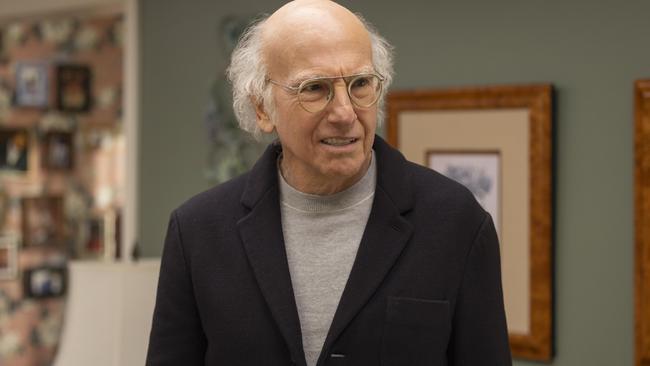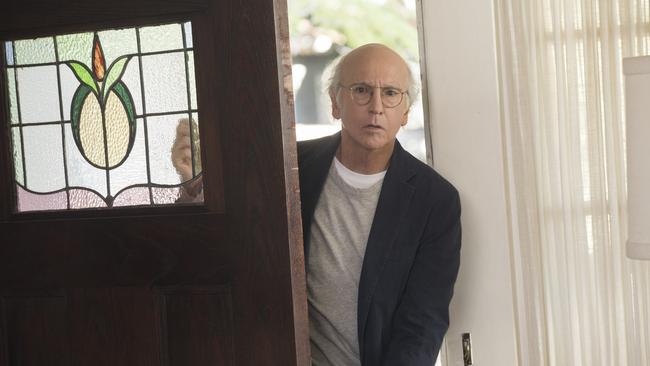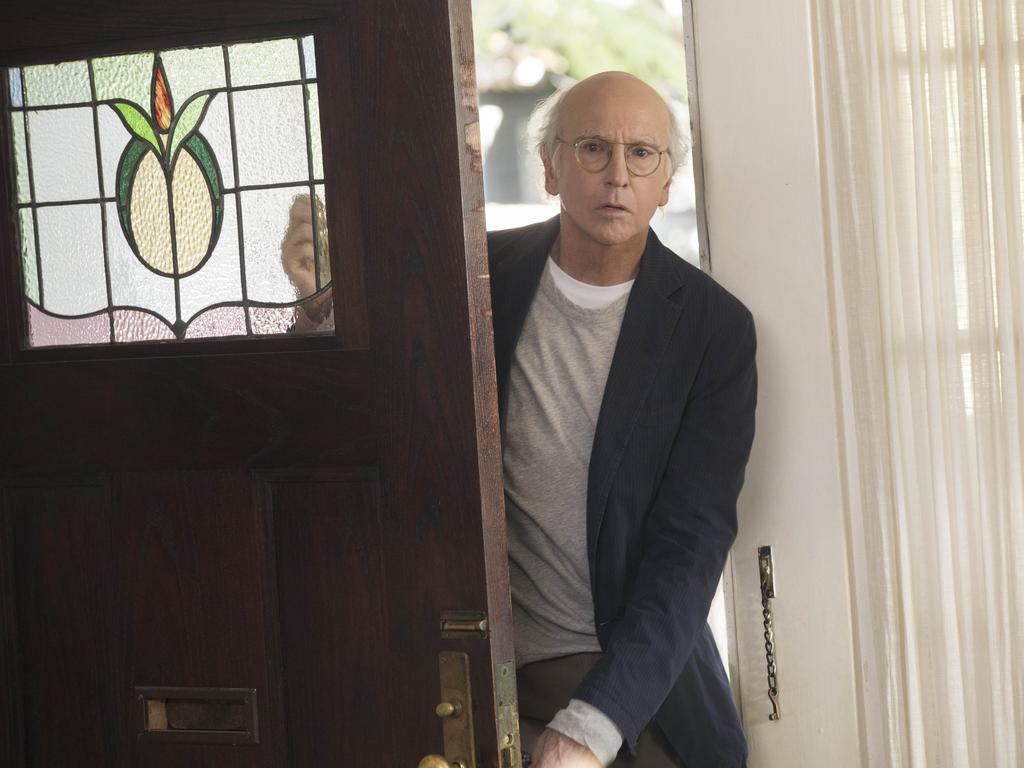Television’s Curb Your Enthusiasm prepares to take its final bow
Twenty-three years after a one-off special, Larry David’s hit HBO program puts its grumpy misanthrope to bed. As one commercial put it: ‘Don’t be mad he’s leaving – be mad he stayed so long.’

Maybe this time it really is the end. Larry David, creator and star of HBO’s longest-running series, Curb Your Enthusiasm, is promising that season 12 is in fact the last. It’s been on television for more than 23 years.
The real Larry David, as he likes to call himself, has finally had enough of the recalcitrant “TV Larry David” ending what one critic, already in mourning, calls “his excruciatingly funny, gloriously captious dissection of social mores and everyday minutiae”.
Mind you, its seasons have been somewhat intermittent since it premiered in 2000, David taking a break for six years between 2011 and 2017. But this spell has been promoted by HBO as “The Final Season” and David as “The Last of his Kind.”
As one commercial put it: “Don’t be mad he’s leaving – be mad he stayed so long,”
When he and HBO announced the show was indeed ending there was a statement from David. It said he “will now have the opportunity to finally shed this ‘Larry David’ persona and become the person God intended me to be – the thoughtful, kind, caring, considerate human being I was until I got derailed by portraying this malignant character”.
Then, at a promotional affair, he continued talking of retirement.
“First of all, I love to travel. You all know that. I’m a world traveller, I go everywhere. I love packing and unpacking. Tipping everybody I come across. Having a medical emergency in a foreign country where they don’t speak English. That’s the greatest. I love that. I’m thinking about Antarctica. I’m hearing good things about it. They’ve got the penguins, come on … I love the penguins.”
Irascible and incorrigible, somehow, he’s back, bringing with him his regular ensemble of deplorables. Jeff Carlin returns as Larry’s best friend, along with his wife, the poisonous, wonderfully profane Susie, played by Susie Essman, JB Smoove insinuates himself into the action again as Leon Black, TV Larry’s former wife Cheryl Hines is back, too, along with Tracey Ullman, Ted Danson and Vince Vaughn.
It’s hard to remember that Curb Your Enthusiasm was originally developed from a 1999 one-hour special for HBO, envisioned only as a one-shot deal. It was to be based on David’s return to the stand-up world of comedy clubs after leaving Seinfeld, which, of course, he co-created.

The comedy special was called Larry David: Curb Your Enthusiasm and would feature his stand-up routine with a small amount of backstage footage and a number of famous guests. The title was to suggest, according to David, “Don’t expect another Seinfeld” and to tell people to keep their day-to-day enthusiasm in check, as his curmudgeonly character most certainly does. “Always keep it,” David said, “To not is unattractive. It’s unseemly.”
Directed by Robert Weide, a famed documentarian who had made films about Lenny Bruce, the Marx Brothers and W.C. Fields, it was a blend of the actual with the ersatz. According to Weide the idea was to apply the rules of documentary filmmaking to “an odd hybrid of comedy and pseudo realism”.
The idea from the start, according to Weide, is to “plant little comedy bombs” that detonate throughout the half-hour, which is still the Curb formula. “The structure has always been different from any situation comedy that’s ever been done,” he says. “One thing sets off a chain reaction of events: Event A leads to Event B and collides with Event C, creating Event D.”
When it comes to the actors, who improvise their lines, Weide likes to say it’s a bit like the CIA. “My standard joke is that actors are given information strictly on a need-to-know basis. They’re given whatever backstory they need and whatever information their character actually has.”
They’re basically only told how they fit into a particular scene. What they don’t know is the overall story arc or any scene they don’t happen to be in. “So they can’t really prepare the way actors normally would. When they’re hearing news on camera out of another character’s mouth, they’re hearing it for the first time. So the reaction tends to be very spontaneous.”
Of that opening season, David says: “You know, when people told me after the show started airing that they had to leave the room for some scenes because they were cringing, and they couldn’t bear to watch – it was like a horror movie – I had no idea it was having that effect on people. That was a complete surprise to me, and I liked it. I liked that they couldn’t see it. But I never really gave it that much thought. I was just trying to do funny shows. I never felt I was going too far. I felt I was doing what I wanted to see.” (He likes to quote S.J. Perelman’s line: “The office of humour is to offend.”)
And nothing much has changed. The actors still work off a rough outline of how scenes will go, largely compiled by David from countless jottings held in a ratty brown notebook, and fill in the blanks with dialogue.
Nor has TV Larry really changed, basically the same relaxed wardrobe, a look he calls “Alpha TV Writer”, and that goofy smile is still in place.
It’s almost always there. Even when he confronts the most disastrous of social circumstances, it plays on his face, hinting at a certain happy bemusement that he should have ended up where he is today, as if to have done so strikes him as almost slightly fraudulent. But with time he has become even more crabby and volatile, that smile even wider.
The first episode, Atlanta, starts with the reintroduction of Larry’s worst nightmare, the supremely untalented Maria Sofia Estrada, played by the very funny Keyla Monterrosa Mejia, who Larry was blackmailed into leading his new TV show Young Larry. She has become of the world’s newest celebrities, feted on talk shows and the cover of glamour magazines. And whether he likes it or not in his life.
Not only that but he’s seemingly stuck with Ullman’s odious city councillor Irma Kostroski as his girlfriend, so furious at her enduring presence that when he gets in his car and asks directions to a restaurant he launches into an unwinnable, profane-laden argument with Siri.
More irritations disturb his equilibrium. He takes exception to a life support corpulent Corgi support dog called Pechuca, confronts a grief-stricken waiter, and is forced to wear a pair of extravagantly unsuitable spectacles. Then there’s a running problem with butt dialling, and Larry must endure a contractual obligation to show up to a rich guy’s party – he’s some wealthy businessman from Africa with an unfortunately named wife called Brooke – and simply be cordial to the guests. Then there is the matter of some entirely unexpected legal proceedings.
What hasn’t changed is the way he represents a kind of distorted mirror in which are revealed our true selves and certainly not least those human characteristics we despise and even fear about ourselves.
In 2005, to promote the fifth season of Curb, HBO went with a rather lateral advertising campaign. It presented a collection of bodies, male and female, in business suits and bathrobes, all bearing Larry David’s head. The tagline went: “Deep inside you know you’re him.”
He’s stubborn, petulant, volatile, and ignorant, completely convinced of his own special place in the order of things. He embodies everything that we wish we could say in public but don’t.
He represents something in all of us, his comedy a mirror of our own foibles, not only our pettiness but the bewilderment and frustration of ageing. Larry is 76 now and in the new season is looking it, even more quickly driven to anger, skinny and his legs oddly spindly, and aggressively out of touch.
In an earlier episode, a passing wellwisher, full of the joy of life, simply asks grumpy Larry to smile. Larry just turns around and says to her, “Hey, mind your own business; how about that?” Like so many of us, he has given up trying to keep pace with a rapidly changing, increasingly formidable world, fated to remain forever on the outside.
Partly defiant and aggressive, partly overwhelmed, his hostile reaction to the world strikes a common chord because it’s so petty and therefore believable, our pathetic rebellious thoughts articulated pompously and honestly self-centred. In the new season’s premiere Jeff calls him a “social assassin”; Larry describes himself as “a person who hates people and yet had to be among them.”
As showrunner Jeff Schaffer says, “People need Larry, although the feeling is not mutual.”
In a world increasingly constrained and socially regulated, we rejoice in Larry David’s politically incorrect chaos, even as we marvel at the way he has not been cancelled like so many other comics.
In a period where incessant virtue signalling can be so irritating, as Time said recently, “the misanthropy Curb radiates has never felt more timely”.
Curb Your Enthusiasm streaming on Binge.





To join the conversation, please log in. Don't have an account? Register
Join the conversation, you are commenting as Logout